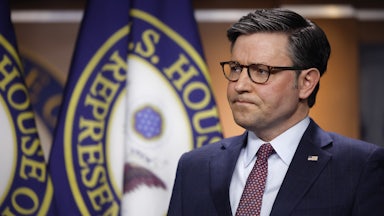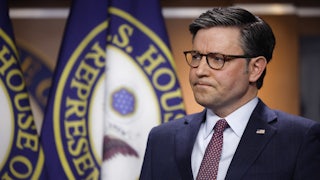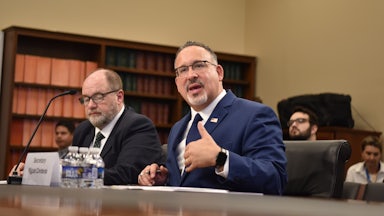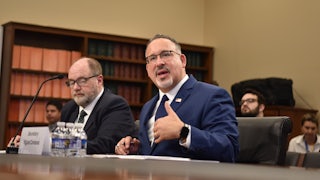A clandestine airstrike here, a little diplomacy there, a wink and a nudge to America’s favorite Saudi failson dictator, and some paeans to democratic accountability at home—President Joe Biden’s foreign policy is taking shape. If you believe the soothing platitudes emanating from the new administration, this will be a restrained, rule-bound presidency overseen by steady-handed bureaucrats who will wind down our “forever wars”—a term Biden himself has deployed—and try to avoid new conflicts.
This week, The New York Times reported that Biden’s team was reviewing the rules governing secret drone strikes and commando raids that were developed during the Obama administration, and loosened under Trump’s presidency. That same day, Senators Tim Kaine and Todd Young introduced a bipartisan bill to repeal the 2002 Authorization for Use of Military Force—which authorized the 2003 U.S. invasion of Iraq—and another that was passed before the first Gulf War in 1991. Two days later, as if in response, Politico published a statement from Biden’s press secretary Jen Psaki promising to repeal the Iraq AUMF and the post-9/11 AUMF that has helped provide legal ballast to two decades of global warfare. According to Psaki, Biden wants to “ensure that the authorizations for the use of military force currently on the books are replaced with a narrow and specific framework that will ensure we can protect Americans from terrorist threats while ending the forever wars.” For good measure, the administration will re-embark on the forever quest to perhaps, one day soon, close the U.S. military prison at Guantánamo Bay.
In a sign that the administration is nothing if not a vertically integrated political messaging operation, Secretary of State Tony Blinken took a break from denouncing investigations into Israeli apartheid this week to promise that the United States is done with regime change. “We will not promote democracy through costly military interventions or attempting to overthrow authoritarian regimes by force,” said Blinken. “We have tried these tactics in the past. However well intentioned, they have not worked.”
“However well intentioned,” indeed. So far, so Beltway. While Biden’s crew is laudably stepping back from the do-anything-to-please-the-boss mayhem of the Trump administration, it remains unlikely that we’ve entered a new era of peaceful international relations. Besides some de rigueur attempts at multilateralism, like rejoining the Paris Agreement, team Biden has yet to stake out much of a progressive foreign policy position. Instead, its early machinations—particularly the promise to repeal and replace the open-ended AUMF—signal a return to something like the early Obama years, when another newly elected Democratic president offered his own hopeful and ultimately doomed promises to close Gitmo and extricate the U.S. military from Iraq. Obama ended his presidency with Gitmo still open and America recommitted to its wars in Afghanistan and Iraq and several other undeclared war zones.
Twelve years after Biden assumed the vice presidency as Obama’s grizzled, and relatively hawkish, consigliere, the U.S. seems closer in word than deed to ending the forever wars. It was only a couple weeks ago that Biden launched airstrikes against an allegedly Iranian-sponsored militia in Syria—and hardly exhibited any compunction in doing so, despite protests from some Democratic politicians. If the mark of a new era in American foreign policy is that future airstrikes will be reported to Congress under an ostensibly more limited set of authorities—the “narrow and specific framework” promised by Psaki—well, that hardly counts as change at all.
Opposing permanent, unbound global warfare became one of the few defensible policy positions occasionally enunciated by the Trump administration and its allies in Congress. Perhaps because Trump was so chaotic, vulgar, and unreliable, few Democrats bothered to align themselves with his stated goal of limiting American interventions overseas. In practice, these goals were never taken up with much seriousness: Trump let the CIA and Defense Department run wild, delegating them autonomy to authorize airstrikes. He droned Iranian General Qassem Soleimani, assisted Israeli assassinations within Iran, and threatened to bomb Iranian civilians and cultural sites. It was only through Iran’s own restraint—perhaps exercised out of self-preservation—that a wider conflict was avoided. (Under Trump, too, the U.S. and coalition forces continued punishing bombing campaigns against ISIS in Iraq and Syria that produced thousands of civilian casualties.)
Revoking any of the several AUMFs on the books would be a positive step, but if they are replaced, as Psaki promised, with another “framework”—however closely regulated—to unilaterally bomb anyone America deems a terrorist, it will be a worse outcome. A return to the Obama-era regime of unacknowledged drone strikes and secret assassinations, supposedly planned by responsible adults with care and deliberation, would simply re-entrench the militaristic paradigm that progressive politicians have ample reason to oppose. Rather than reforming the system, this would constitute a reversion to the status quo ante and the misbegotten belief that America’s role is still to police the world against extremist threats, as long as it appears it’s doing so with a velvet-gloved hand.
The 2001 AUMF is an important legal document, but its legacy will also be felt on the level of culture and politics. Under its infinitely elastic 60 words—the most dangerous sentence in U.S. history, according to BuzzFeed—everything from targeted rendition to torture to secret wars has been justified, with no respect for national borders. The AUMF has been the great emancipatory document of post-9/11 militarism, absolving Americans of any guilt—or even any direct knowledge—of what their government does in their name. It has also provided a model for how to do this all over again. The only thing needed to authorize decades of American warfare is a fig leaf piece of legislation. That’s what passes for democratic accountability.
The problem is not just that America is stuck waging a collection of forever wars, but that these wars have been institutionalized; justified as the normal, sensible course of business. The truth is that—contra Psaki’s statement—we live in a fairly safe country. And yet we legislate, spend, and act as if foreign armies and terrorist hordes sit on our collective doorstep. The few actual terrorist threats facing the U.S. can be tackled through law enforcement, the judicious use of intelligence work, and international cooperation. The main lesson of the post-9/11 era should be that violent American interventionism only worsens the problems of terrorism and political instability. They may not be democrats, but Somali rebels and Yemeni peasant-fighters aren’t threats to the U.S. “homeland.”
A more restrictive authorization for the use of military force is still an authorization of military force. Congress should resume its constitutional duties and remove the choice from Biden’s hands entirely, by repealing all of the existing AUMFs and preventing the passage of other such blank checks. The logic is so obvious as to be practically tautological: If you want to end the forever war, then you have to end the war—not provide a revised legal pretext for the next.








